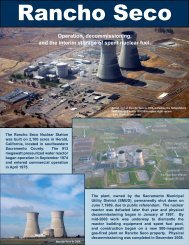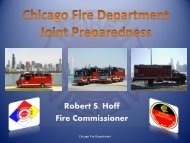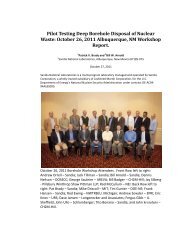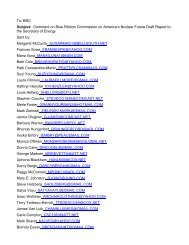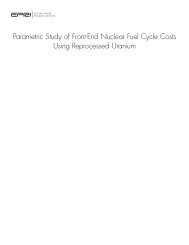Good morning, ladies and gentlemen, Thank you for this opportunity ...
Good morning, ladies and gentlemen, Thank you for this opportunity ...
Good morning, ladies and gentlemen, Thank you for this opportunity ...
Create successful ePaper yourself
Turn your PDF publications into a flip-book with our unique Google optimized e-Paper software.
<strong>Good</strong> <strong>morning</strong>, <strong>ladies</strong> <strong>and</strong> <strong>gentlemen</strong>,<br />
<strong>Thank</strong> <strong>you</strong> <strong>for</strong> <strong>this</strong> <strong>opportunity</strong> to address such a distinguished audience.<br />
My name is David Lartonoix, I am a graduate student at the University of Illinois in the<br />
Department of Nuclear Engineering.<br />
My thesis adviser, Dr. Clif<strong>for</strong>d Singer, professor of political science as well as nuclear<br />
engineering, along with Dr. William Roy of the IL State Geologic Survey <strong>and</strong> Dr. James<br />
Stubbins, nuclear engineering professor <strong>and</strong> department head, have recently submitted a<br />
response to the Blue Ribbon Commission’s draft report.<br />
At <strong>this</strong> time, I would like to reiterate <strong>and</strong> reemphasize their key point:<br />
First <strong>and</strong> <strong>for</strong>emost, the recommendations in the July 2011 draft report of the Blue Ribbons<br />
Commission on America’s Nuclear Future represent a major conceptual step <strong>for</strong>ward. However,<br />
I would like to start by addressing one major, potentially fatal flaw. Specifically, <strong>this</strong> problem<br />
pertains to states’ roles in the recommended consent-based process <strong>for</strong> citing new<br />
management facilities <strong>for</strong> nuclear reactor fuel discharges. The executive summary of the draft<br />
report says that the role of states should be quote “an element of negotiation” <strong>and</strong> refers to<br />
states having quote “a meaningful consultative role.” In addition, states have a quote<br />
“responsibility to work in the national interest.”<br />
It is our recommendation that the Blue Ribbon Commission unambiguously define what exactly<br />
the potential host states’ role will be.<br />
Given past history, ambiguity about the state’s role is not just a minor editorial concern, but<br />
rather a very serious concern. In 1992, Wyoming Governor Michael Sullivan rejected a<br />
monitored retrievable storage site in his state, in effect on the grounds that the federal<br />
government could not be trusted to be a reliable negotiating partner. Without fully <strong>and</strong> clearly<br />
defining a state’s rights <strong>and</strong> role in the negotiation <strong>and</strong> discussion <strong>for</strong> a future site, it is very easy<br />
to underst<strong>and</strong> why a present-day governor would feel the exact same way.<br />
To avoid <strong>this</strong> potentially fatal flaw, the final report should do one of two things:<br />
One approach is to unambiguously recommend that no siting process will be initiated or<br />
continued without the fully voluntary cooperation of the prospective host state government. If<br />
<strong>this</strong> route is chosen, it should be clearly recommended that surveys, licensing, construction, <strong>and</strong><br />
operations should only proceed at the invitation of the prospective host state.<br />
Or, on the other h<strong>and</strong>, the final report should make an unambiguous recommendation that the<br />
federal government offer attractive incentives <strong>and</strong> reassurances, but then define under what<br />
conditions it will proceed with a compulsory siting process if the offers made prove insufficient.<br />
In addition, if the first option is chosen, the final report should discuss the possible alternatives<br />
<strong>for</strong> states that currently store nuclear reactor fuel discharges in case the federal government<br />
proves unable or unwilling to <strong>for</strong>ce another state to site a facility.
If the second option is chosen, the final report should clarify exactly at what stages of the<br />
search, licensing, construction, or operation of a facility a potential host state’s objections could<br />
be over-ruled.<br />
In conclusion, as Illinois currently harbors the most nuclear reactor fuel discharges of any state<br />
in the nation, the ultimate conclusions of the Blue Ribbon Commission are bound to impact us<br />
significantly. We there<strong>for</strong>e ask that <strong>you</strong> carefully <strong>and</strong> thoughtfully consider the state’s role in the<br />
negotiation process with the federal government, <strong>and</strong> outline a definite conclusion in <strong>you</strong>r final<br />
report. We appreciate all the work <strong>you</strong> have done so far on <strong>this</strong> matter, <strong>and</strong> patiently await <strong>you</strong>r<br />
final draft.<br />
<strong>Thank</strong> <strong>you</strong> <strong>for</strong> <strong>you</strong>r time.


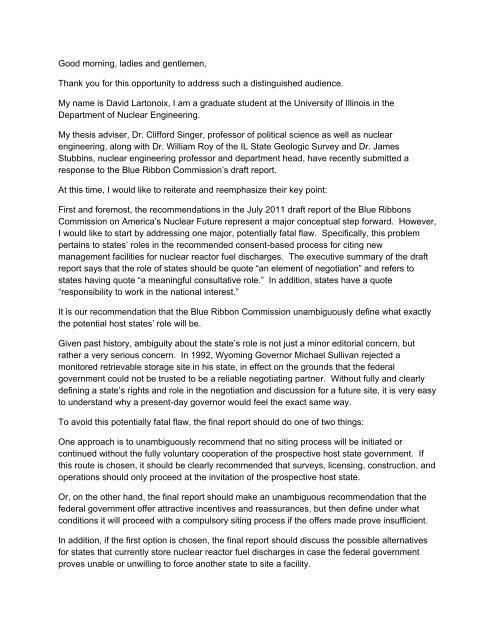
![Rainer Schottlaender[SMTP:RAINER.SCHOTTLAENDER@WEB.DE]](https://img.yumpu.com/51418350/1/190x245/rainer-schottlaendersmtprainerschottlaenderwebde.jpg?quality=85)

